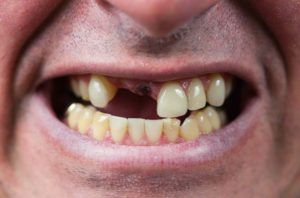
Any injury that requires an “emergency” visit is traumatic. When it comes to having a tooth “knocked out,” it can be an emotionally complex experience.
Dental “avulsion” is when a tooth has been knocked completely out, even if it is hanging by tooth root tissues.
Typically, these injuries cause excessive bleeding. This makes the injury seem even worse but should subside by applying pressure. However, if the bleeding continues after 30 minutes of pressure, seek medical attention immediately.
In any case, a permanent tooth that is knocked out is a major concern, whether it occurs to an adult or child. Often, these teeth are front teeth that will leave an obvious gap in one’s smile. Research has also shown that a missing tooth can affect one’s psyche in addition to appearance.
Facial appearance is somewhat of an individual’s ‘calling card’. A smile, which is often what others first notice, plays a fairly big role in self-identity. For many people who have experienced tooth loss (especially sudden tooth loss), feelings of low self-confidence are common.
These feelings can carry into other aspects of an individual’s work and social life. One study cited by the Academy of General Dentistry of 20,000 dentists reported that 86 percent of patients with tooth loss shared feelings of social embarrassment and less willingness to have social interaction (as compared to adults with a complete smile).
There is also a social stigma that surrounds tooth loss. Obvious tooth loss is often associated with low income and/or poor hygiene.
Although the emotional effects are damaging, the physical effects of tooth loss can be equally so. Tooth loss can cause difficulty when chewing or in speech. These can add to the concerns about being socially active. This feeling of insecurity can interfere with one’s interactions of close friendships or romantic relationships.
In some cases, a natural tooth can be saved if prompt actions are taken. The first step, of course, is to place pressure on any bleeding. The rescued tooth should be immediately placed in milk or water — do not attempt to clean it or handle it. If the tooth can be comfortably held within its socket, it can stay there unless there is a risk it will be swallowed. Having a young child do this may not be advisable.
Get to a dentist as quickly as possible. Most dental offices will have after-hours instructions on their answering service for an emergency need. The dentist seen will want to begin by taking X-rays to determine the extent of the damage as well as perform an oral examination before making recommendations.
Every situation and individual is different, so saving the tooth, even if prompt action is taken, is not a given. In the best case scenario, however, the dentist may decide to reinsert the tooth. If this appears to be an option, subsequent dental visits will be needed for the dentist so the healing process can be monitored.
Complete dislodgement of a tooth from its socket most commonly occurs with children. Saving the tooth by replacing it is less successful for children because their tooth roots may not be completely developed. Although progress is being made through developments in gene research, (findings published in Journal of Periodontology), promising results are being seen in tooth replantation. Through a gene delivery system the healing process can be enhanced.
As stated previously, the time factor in replanting a lost tooth has a major impact success. Quick response means the ligament that holds the tooth in place and dental pulp do not start to die. Fibers can then reattach, and the blood vessels and pulp tissue can continue to grow and support the tooth.
In the past, one factor that affected replantation was the occurrence of inflammation. Inflammation affects messaging pathways and can activate cells, degrading the tissues surrounding the tooth’s root. This often severs the potential for successful replantation.
Knowing this, researchers studied lab rats, using a gene therapy to strengthen root thickness. As this study, and others like them, continue to show positive results, the hope is to greatly improve the success rate of tooth replantation.
https://medicalxpress.com/news/2021-09-root-tooth-replantation.html
While this is positive news for adult tooth injury victims, I would like to urge parents to react the same with children’s primary teeth as with adults who are dealing with “permanent” teeth. Although a “baby” tooth will eventually be replaced (starting around age 6 or 7, and by 12 years old), the fact that baby teeth aren’t permanent doesn’t diminish their importance.
Baby teeth serve as placeholders for permanent teeth. They save specific spots for the “adult teeth” that will emerge. This is why early dental care is so important, to help a child avoid a decayed baby tooth. When a decayed primary tooth must be extracted, it leaves an open gap. This means the other teeth can shift out of the positions they are meant to hold.
Shifting can result in crowding and misalignment of the teeth and jaws. It can also increase the risk of impacted permanent teeth that are blocked from erupting.
Those baby teeth are important for more reasons than the emergence of adult teeth. Primary teeth encourage jaw, muscle and facial development. This has much to do with oral and facial structures. This includes the child’s airway, which is in development while baby teeth are in position. The bone that supports teeth is also dependent on the presence of teeth to stimulate its proper growth.
A study published in the Journal Sleep & Breathing found that missing teeth in early childhood, either from a congenital condition or extractions (as in the case of baby teeth that are severely decayed), can interfere with facial development and lead to a narrow upper airway. This can eventually evolve into obstructive sleep apnea.
And children are capable of having sleep apnea, even if they do not snore.
https://www.mayoclinic.org/diseases-conditions/obstructive-sleep-apnea/symptoms-causes/syc-20352090
Accidents happen. Knowing how to react can increase the potential for a positive outcome. For a tooth, it can mean the difference between saving it or having to make decisions for replacement. For children, proper actions can make a difference for a lifetime.
For any dental need for tooth replacement, including dental implants, call our Shelby Township dental office: 586-739-2155 or tap here for a free consultation. If dental fear is an issue that has prevented you from having regular dental care, we offer Oral and I.V. Sedation (“twilight sleep”). Both are administered safely and have a quick recovery.